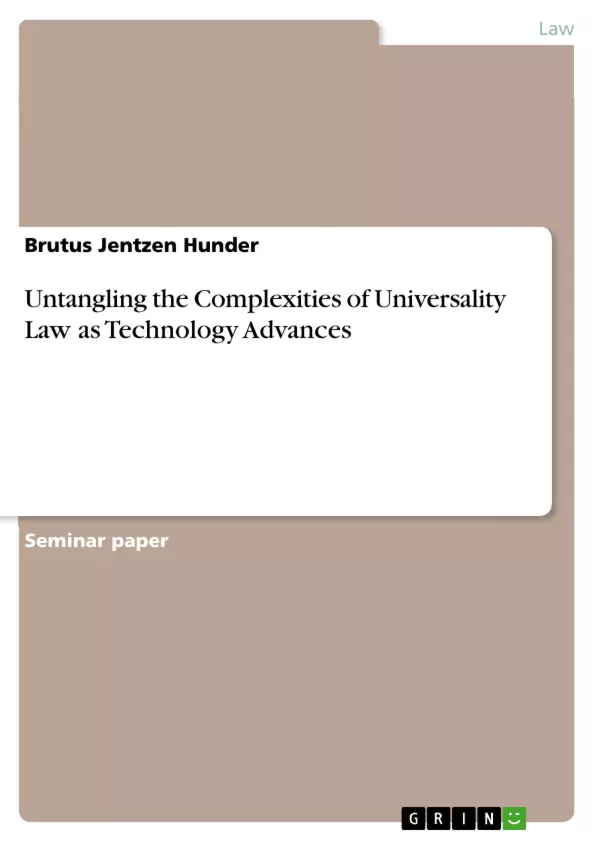In today's interconnected world, technology has become an integral part of our daily lives, transcending borders and reshaping societies on a global scale. As the rapid advancements in technology continue to transform various industries and sectors, it is crucial to comprehend the complexities of the laws and regulations surrounding its universality.
This paper delves into the complications that arise as technology rapidly increases globally, exploring the challenges of navigating legal boundaries, harmonizing global standards, protecting intellectual property rights, ensuring privacy and data protection, addressing cybersecurity concerns, and providing insights into achieving universal laws that can effectively govern and accommodate the rapidly evolving technological landscape. By understanding the legal implications of universality, we can foster a balanced and inclusive environment that promotes innovation, accessibility, and protection for all.
Inhaltsverzeichnis (Table of Contents)
- INTRODUCTION
- CHAPTER ONE: Importance of Addressing Legal Complications
- The Evolution of Technology: Rapid Advances and Global Impact
- Global Implications of Technological Progress
- The Challenges of Universality: Legal Complexity and Global Harmonization
- CHAPTER TWO: Complexity of Implementing Universal Laws: A Multifaceted Challenge
- Importance of Global Harmonization
- Jurisdictional Issues: Navigating Legal Boundaries in a Borderless Technological World
- Cross-Border Legal Conflicts and Resolutions
- CHAPTER THREE: The Multifaceted Imperative of Intellectual Property Protection
- Challenges in Achieving Universal Intellectual Property Laws
- Privacy and Data Protection: Safeguarding Individual Rights in a Global Digital Landscape
- CHAPTER FOUR: Legal Frameworks for Global Data Protection
- Rising Threats and Cybercrime Vulnerabilities in the Digital Age
- Legal Frameworks for Cybersecurity
Zielsetzung und Themenschwerpunkte (Objectives and Key Themes)
This book examines the complexities of creating universal laws in a rapidly evolving technological landscape. It explores the challenges of navigating legal boundaries, harmonizing global standards, and addressing the ever-growing concerns related to intellectual property, privacy, and cybersecurity.
- The impact of technology on global legal systems
- The challenges of harmonizing international laws
- The importance of protecting intellectual property rights in a globalized digital world
- The need for robust data protection frameworks
- The rising threats of cybercrime and the importance of cybersecurity
Zusammenfassung der Kapitel (Chapter Summaries)
Chapter One discusses the rapid advancements in technology and their impact on the global legal landscape. It highlights the challenges of achieving universality in laws, considering the complexities of legal boundaries and harmonizing global standards.
Chapter Two delves into the multifaceted challenges of implementing universal laws. It examines the importance of global harmonization, jurisdictional issues, and the complexities of resolving cross-border legal conflicts.
Chapter Three explores the imperative of protecting intellectual property rights in a globalized digital landscape. It analyzes the challenges in achieving universal intellectual property laws and the need for safeguarding privacy and data protection in a digital world.
Chapter Four focuses on legal frameworks for global data protection. It addresses the rising threats and cybercrime vulnerabilities in the digital age and examines legal frameworks for cybersecurity.
Schlüsselwörter (Keywords)
This book primarily focuses on the legal implications of technology advancement, exploring themes such as universality of laws, global harmonization, intellectual property rights, privacy, data protection, and cybersecurity. The book highlights the importance of addressing the legal complexities arising from a rapidly evolving technological landscape.
Frequently Asked Questions
What is "Universality Law" in the context of technology?
Universality law refers to the attempt to create harmonized legal standards and regulations that can effectively govern technology across national borders.
What are the main challenges of borderless technology?
Key challenges include jurisdictional issues, cross-border legal conflicts, and the difficulty of enforcing local laws in a global digital landscape.
How does technology impact intellectual property rights?
Rapid technological advances make it harder to protect digital assets, requiring global harmonization of IP laws to ensure fair compensation and protection for creators.
Why is global data protection necessary?
As data flows freely across borders, individual privacy rights must be safeguarded through international frameworks to prevent misuse and ensure security.
What role does cybersecurity play in international law?
Cybersecurity requires legal frameworks that address rising threats and cybercrime vulnerabilities, promoting cooperation between nations to combat global digital attacks.
How can legal complexity be addressed as technology advances?
The paper suggests that achieving universal laws through global harmonization is essential to foster innovation while protecting accessibility and individual rights.
- Quote paper
- Brutus Jentzen Hunder (Author), 2023, Untangling the Complexities of Universality Law as Technology Advances, Munich, GRIN Verlag, https://www.grin.com/document/1383518



